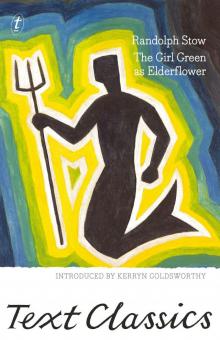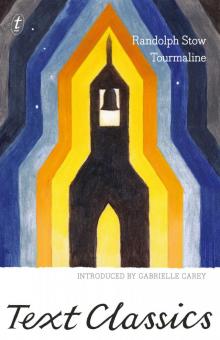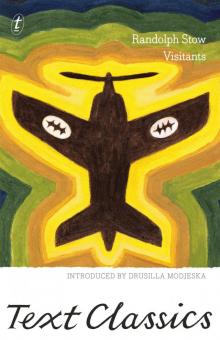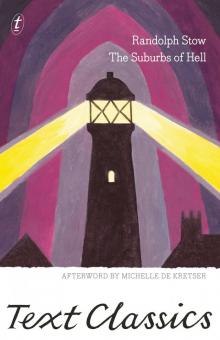- Home
- Randolph Stow
Tourmaline Page 2
Tourmaline Read online
Page 2
From there you command the whole town: the rust-red roofs, the skeletal obelisks of headless windmills, the sudden green of Rock’s forlorn garden. That is all there is of Tourmaline.
A man called Hart found gold here, many years ago. Others came. The gold was sufficient, it seems, and there was water in those days. I can remember the water. I can remember rain in Tourmaline. I am not young.
It is not a ghost town. It simply lies in a coma. This may never end.
On the day he came, the diviner, we had a death in Tourmaline. But it was not one of importance. Billy Bogada, in the native camp, was noticed by his nephews, when they rolled out at daybreak, to have departed. The women mourned a little, out of courtesy, and the nephews went to Tom Spring for a packing-case the size of the deceased. I watched them, later in the day, carry him down the road to the cemetery; their skins shining in the glare of the stony ground, the box on their faded blue cotton shoulders. SPRING—it said. PERISHABLE.
Charlie Yandana sang, squatting on the ground outside my door, in the narrow shade of the dead pepper tree. He was young, and not bereaved, but he liked to sing. It was a hymn, perhaps.
Death, oh death, oh
you been going a long time now.
When you gunna take a rest,
oh death?
His voice, young and flippant, made me desolate. I had had my morning rendezvous with the world, my walk to the war memorial, and so come to the time of day when I doubt the reality of myself. Those names give me a name. But when I am quiet and alone, and have turned on the wireless (as on every morning for—ah, too many years) and have spoken, and have listened, and as on every morning since these terrible times began have heard no answer—when I am quiet and alone I cannot believe in it. Who gave me this name? And beside the name, what is there? An unnamed and naming ghost, perhaps, formless, but forming for some obscure purpose of its own a room of pale stone, ledges heaped with red dust, a shelf of tattered books, a cupboard, a safe. Then detail derides the egoism. What use has this mind for the rusty handcuffs hung on the doorframe, the map of Western Australia, the legs of Charlie Yandana sweating in the sun? The house I haunt is furnished and inhabited. A terrible loneliness is touched by the young voice.
So I resented Charlie Yandana. But I did not speak to him. Silence is a habit as enslaving as the most delicate vice, and as time goes on to talk (to talk, that is, to anything but the waiting, perhaps, but forever unanswering wireless) becomes embarrassing, as if, shaving, one should address some remark to the mirror and be overheard. I find that there is no speech that is not soliloquy. And yet, always, I sense an audience.
When the singing stopped, the silence reached around us. Morning and noon passed with variations of shadow, slight mutations of light. The blotches on my hands made me think of age. What enormous and desolate landscapes are opened by the voice of a lone crow.
There is much I must invent, much I have not seen. Guesses, hints, like pockets of dust in the crevices of conversation. And Tourmaline will not believe me.
But (dear God) what is Tourmaline, and where? I am alone. I write my testament for myself to read. I will prove to myself there has been life on this planet.
The cells are unroofed, the bars are gone. Records of intriguing crimes and acts of justice blow in the yard. In other places, it is believed that Tourmaline is dead.
There is no law in Tourmaline: this is known there. The gaol abandoned and crumbling, the gaoler dead. So all must assume.
Yet I live on, prisoner of my ruined tower; my keys turned on myself now all the locks are gone.
The Law of Tourmaline. Guessing, inventing. Ghost of a house furnished and inhabited, tormented by the persistence of the living.
On the long bar of Kestrel’s hotel (that day and every day, you must imagine) were three fly-traps. And the prisoners climbed and fell back continually with a soft, intermittent, sickening fizz. Glasses and elbows and stains of liquor surrounded them. The window-panes were painted over, the air was close, but cooler; the smell of sweat was overlaid with the clean and bitter tang of dust. Perhaps a sharper scent was there, too, from the leaves of myall baking in the sun.
A road of daylight led from the open door to the cash-register, striking deep jewel-tones from liqueurs that will never be drunk in Tourmaline. It struck, also, a gold bangle on the wrist of Deborah, in which the sombre green of the walls merged with the tawny glimmer of her half-caste skin.
It rose on Deborah herself, very tall, very straight; her back uncompromising and austere, her calm hands folded. That tallness had entered into her character, making her remote; almost, at times (that aloofness partly obscuring her), invisible. But she was timid, too; the profound darkness of her eyes unwilling to be looked into. Imagine her there.
Unlistening, wrapped in her clouds of exile; absorbed in her bangle, in which the room had intruded a confused and gentler impression of itself.
While Kestrel, a thin black line in the bangle, leaned over the bar and talked to Rock; the black forelock overhanging his black Celt’s brow, and his face suggesting experience of every bitterness the world had to offer. And yet he was not old (at thirty-five, alas), not ugly, not acquainted with life beyond Tourmaline. The bitterness lay not in the lines of his face (which was smooth, almost a mask) but in the thin, bent, vulnerable lips; and there was a little, more than a little, in the soft voice. And yet, at least until Deborah came to distract him from drink, there was something altogether conflicting to be surprised at times in his eyes. Imagine him there.
And (Rock speaking) looking round, perhaps, at her. And she then, aware of him, of course, in her bangle, lifting her head to meet his eyes. But never smiling, neither one. It was always and only that: the encounter of eyes staring as through windows, and the whole room filled with despair.
A strange love indeed. Yet they loved—bitterly.
Once he said, interrupting Rock: ‘What are you dreaming about?’
And Deborah, her eyes down on her bangle again, murmured: ‘When will the truck come?’
And so, a communication made. Incapable of conversation, both of them, except with others. But all day and night they would be throwing words at one another, words meaning all one thing. Look, I am here, I have not gone from you, not yet.
And imagine Rock, made sad by them, gazing into his rum. A martyr to sadness, that large and wooden man. Draining his glass and picking up his hat, and turning towards Deborah to nod to her, or smile, or something; but finding her drowned in her bangle. And so going past her, and into the street of Tourmaline—that road I have described already, as soft with dust underfoot as if carpeted with red fur, but hot and solid rock below for all that.
And they behind him, in their desperate room, saying nothing. The air dull and heavy, the light greenish. A clock cutting across the sizzling of the captive flies.
Easy, easy to imagine them there forever; and the red dust rising to bury them as they stand, like the householders of Pompeii.
To begin, I must imagine and invent.
Tom Spring, on a rickety chair, behind the counter of his store, sleeves rolled up on his thin strong arms. A small strong thin man, Tom; quiet, so quiet one might stop and listen, in surprise. A deep Quaker quiet, an act of religion, that might help his soul to become like a great cave and trap and amplify the faint whisperings of God—that was the silence he was building, behind his quiet eyes, under his thinning hair. Imagine him there.
A fly or two whining and bumping at the window. And the cat rapt, oblivious, like one who has received enlightenment.
And Mary, in the kitchen perhaps, or coming in to spray the flies (which, it could be, she heard from another room, shattering the holy calm), with her dark greying hair and her plump arms, her immovable charity. Imagine her there.
And the belts, boots, billy cans, bridles and halters and flypapers hanging from the rafters. The rust. The dust—needing no apology, since Tourmaline dust is nothing if not sterile. The piles of blankets and shirts, of trouse
rs and tinned food, on tables and shelves.
And the flies, on their backs, kicking and fizzing a little before dying. And then silence, unbroken even by God.
Outside, under Kestrel’s veranda, men sat in the dust; propped against a wall, sharp knees drawn up, with glasses in their hands. Ah, Tourmaline is a great leveller. Their clothes, their bark faces, their attitudes were identical; their lassitude was a communal affair, or perhaps a form of pestilence. And under Tom Spring’s veranda two tired black men lay asleep.
And Byrne was there, sprawled across the step of the war memorial with his guitar; drunk, his eyes in their cavernous sockets obscure with it, satanic eyebrows bent like a pair of kylies. Kestrel’s cousin, poor Byrnie, with his devilish face and no vice in him. A gentle man, and virtuous too (but indeed there is not much scope for sin in Tourmaline). Imagine him there.
Calling out to Rock, perhaps: ‘I’m broke, Rocky. Ah Rocky, I’m not drunk enough.’
Or singing, brushing the sharp chords from his guitar.
Then, in the distance, a cloud of dust, a glint of metal. A murmur rising among the lounging bodies. ‘The truck. The truck.’ And Kestrel issuing from his door, and Mary Spring from hers.
And I myself appearing, pacing the road from my prison with long authoritative strides. My hair grey and streaked like last year’s stubble, my face like an aerial photograph of the most barren ranges in the land. Imagine me well.
All of us, all Tourmaline, gathered in the street. And the truck slowly coming, its hot green paint powdered with Tourmaline dust, a grotesque hand of yellow metal dangling beside the driver’s door. Waiting, all of us.
All but Byrne; who swept the chords of his guitar, and sang a song of his Scottish forebears, keening in drunken grief.
‘New Holland is a barren place,
in it there grows no grain,
nor any habitation
wherein for to remain…’
TWO
Perhaps it was natural that we should be in awe of him, the driver of the truck. After all, it was many years that he had been coming, once a month, from the back of the blue ranges; and always he hugged to himself the mystery of his life’s true ambience, as if it could endanger us. He would hardly speak. He was as zealous as a grandmother guarding the facts of life. There were days when he might take a glass of rum from Kestrel, exchange a few words with him about certain dealings in gold (which, when I was young, would have been illicit, though who cares now?); but then, warily, huskily taking his leave, he would climb again into the sweating cab of his truck beside the obelisk, which the bystanders in the meantime would have unloaded, and without a wave creep away, through the galah-feather dust, towards his home behind the hills. And for days, sometimes, his tyre-marks would remain with us, to remind us of his reality; but as soon as the first wind erased them he became insubstantial, and our memories could not re-create him, could seize on nothing but the dangling yellow hand beside his door.
So, on this day, he came, and stealthily swept around the obelisk to pull up by Kestrel’s veranda. And Kestrel and I, the town’s senior citizens, came forward, to do him the greater honour.
He climbed out slowly, even majestically: there was something majestic in his solitude. He advanced a step or two to meet us. A small man, really, in dirty khaki, with great reaching eyebrows like the antennae of moths, and a thin insect-voice, drowsy, like locusts, as I remember them long ago in fallow fields when I was young.
I listened to his insect-voice. I did not hear his words. He lulled me, with the recollection of summer paddocks. He was saying: ‘I want some help,’ and it seemed mysterious, unlikely. I looked at Kestrel, who was watching the small man.
‘I’ve got a bloke here,’ the driver said. So calmly, it seemed impossible. ‘I picked a bloke up on the road.’
Byrne was on the other side of the truck, his guitar in his dusty hand. ‘You picked a bloke up?’ he called across. ‘Where in God’s name did you find a bloke?’
‘He was lying on the road,’ the driver said. ‘He’s bad. I think he’s finished.’ And so coldly he said it, in his insect-voice, that I felt once again the danger—the terrible danger—ah, I cannot tell what terrible danger I apprehended from behind those blue hills.
But Tourmaline was agog. Rock and Mary were standing beside us, and their eyes were avid. Jack Speed, who was holding up Byrne (he swayed somewhat), looked like a child at Christmas. Horse Carson called: ‘Where is he?’ with all the eagerness of a fasting cannibal. One could read it in every face: an event had occurred, an event whose magnitude and significance Tourmaline had difficulty in estimating.
The driver waved at the truck; and slowly, majestically, walked round to the other door. Kestrel and I followed at his heels, and the rest massed about us. Strangely (I cannot express it) it seemed like an unveiling; such a ceremony as I think the dedication of our noble obelisk never was, far, far more mysterious, fraught with danger and promise. And I felt, as the small man reached up his arm to the handle of the high door and I noticed the golden glint of the fuzz on his arm, I felt, deep inside me—such curious yearnings.
Kestrel was beside me as the door opened. For a second I glimpsed the figure inside it, a man also in stained khaki, who had been slumped against the door. For a second only. And then he began to fall.
But Kestrel reached up and caught him. And that was how we first saw the diviner; his yellow hair, streaked and sun-bleached, on Kestrel’s shoulder, and one blistered and swollen arm hanging limp down Kestrel’s back.
Weaker and more helpless than the smallest child in Kestrel’s arms. And when I think back I wonder if we didn’t, in those first days, see the truth of him. But no, there was more, there must have been. It was only Kestrel who was deceived by that complete surrender. He was more, far more; but not at that moment. Then, he was helpless, defeated. And disfigured—terribly. But he had been far, so far, in country never mapped, on the border-lands of death. He had been where Kestrel had not, where none of us had ever been. And he brought news.
But not at that moment. Then, he was limper than an infant; and the sight of his dreadful arm against Kestrel’s shirt was too much, too much for me.
‘Ah, Christ,’ Kestrel said. He had moved back a little, very gently. ‘Ah, Jesus Christ, the poor bastard.’
And Mary Spring, when she had seen the stranger’s face, did not object to this rude compassion.
I came to Kestrel’s side and took the sagging body by the waist. We laid him down in the dust, in the truck’s narrow shadow. He had a golden beard, of about a fortnight’s growth. And his hair was like hay, like the outside of a new stack, after the first few rains.
But his face was terrible and enormous, swollen to huge size and burning like the sun. He had no eyes, it seemed. The lids had swelled till they appeared to fill the sockets, he could not have opened them. And above all that was his bright young hair.
‘He’ll die,’ Byrne said. ‘Will he die, Kes?’ No one had ever heard him so hushed.
‘Oh, he’s young,’ Mary Spring said; praying, I suspect. ‘Deborah, look, he’s quite young.’
‘How could you tell?’ Rock asked her. ‘He hasn’t got a face, properly speaking.’
‘His hair,’ Deborah said. ‘His hair’s young, Rocky.’
‘About my age,’ said Jack Speed, who was twenty-five.
‘And not likely to get much older,’ said Horse Carson.
‘Kes, is he going to die?’
Kestrel was impatient. ‘How should I know?’ He mused over the ruined face, enquiring: ‘Is he conscious?’
‘He was,’ the driver said. ‘Just. I picked him up by the side of the road, fifty miles back. Had to manhandle him into the truck.’
He stood aloof, meanwhile, one hand on the truck door. The droning voice floated down to me from the sky as I kneeled by the prone man. I listened to the painful breath force its way through the huge lips, thinking—what was I thinking?—a life, a new life in Tourmaline, a life to save, a lif
e. So precious it seemed, of such incalculable value. A life for Tourmaline.
Kestrel, beside me, looked up at the standing man. He asked: ‘Do you want to take him back with you?’
‘What for?’ The driver sounded as if he genuinely wished to know. ‘He’s had it, that’s for sure.’ And I thought again of the terrible danger, feeling angry and afraid.
‘He’ll stay here, then,’ Kestrel said; slowly, even doubtfully, because this was after all an unheard-of experiment. ‘All right. I’ll have him.’
‘No,’ Mary said. She was quite determined.
Kestrel got up off his haunches and looked at her, grinning a little with his bitter mouth. ‘Why’s that, Mary?’
‘We’ll have him,’ she said.
‘You think I ought to trade you this bloke for Deborah?’
‘Kes,’ Deborah said, hating him.
‘All right, all right,’ Kestrel said, ‘you can have him. Let’s get him inside, that’s all.’ He bent down and lifted the man’s limp body, with his hands under the stiff dry cloth at the armpits.
In the meantime, since Horse and Rock and two natives had unloaded the truck of its cargo of such food and liquor and kerosene as Tourmaline can afford, the driver had gone round to the other door. We were startled by the sudden slam of it. He was sitting there, high up, behind the steering wheel.
‘You going?’ Byrne called out.
The driver answered him by starting the engine.
‘You bastard,’ Byrne suddenly yelled at him. ‘You slimy black bastard. I hope you break down and fry in your syphilitic bloody truck.’
But the truck was already moving, the driver heard nothing. Slowly he slid away, towards the red road and the ranges, remote, mysterious. And Byrne, meanwhile, clutching his guitar in the middle of the road, was weeping with rage and pity. This was the eccentricity of Byrne, that drink brought him to tears.
And the diviner lay now in the open sun, looking very terrible. It was too much, too much to bear. We wanted to cover him, even bury him, anything rather than to go on looking at the monstrous joke of his face.

 The Girl Green as Elderflower
The Girl Green as Elderflower Tourmaline
Tourmaline Visitants
Visitants To the Islands
To the Islands The Suburbs of Hell
The Suburbs of Hell